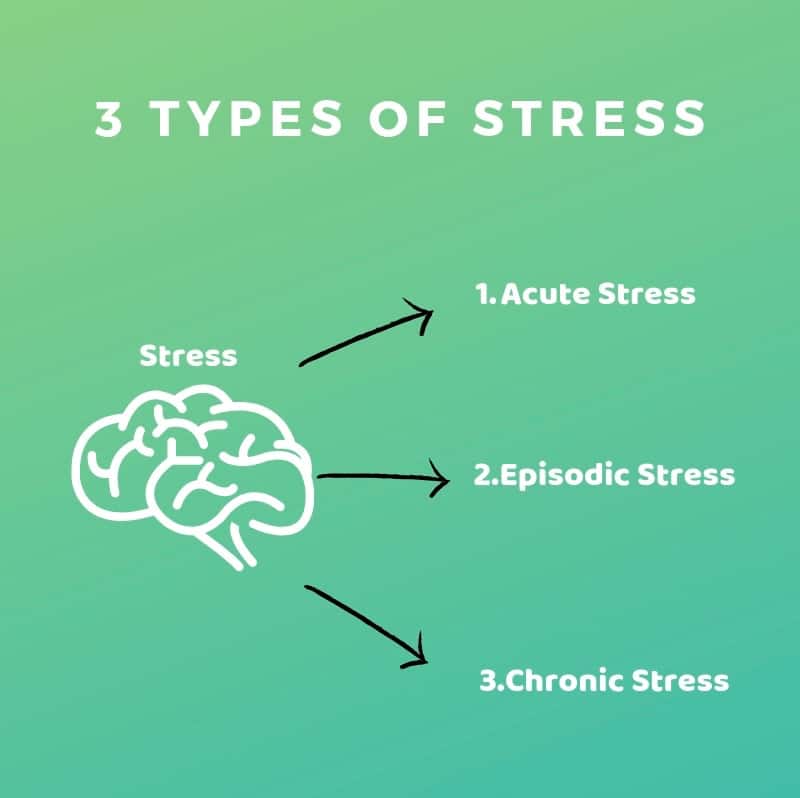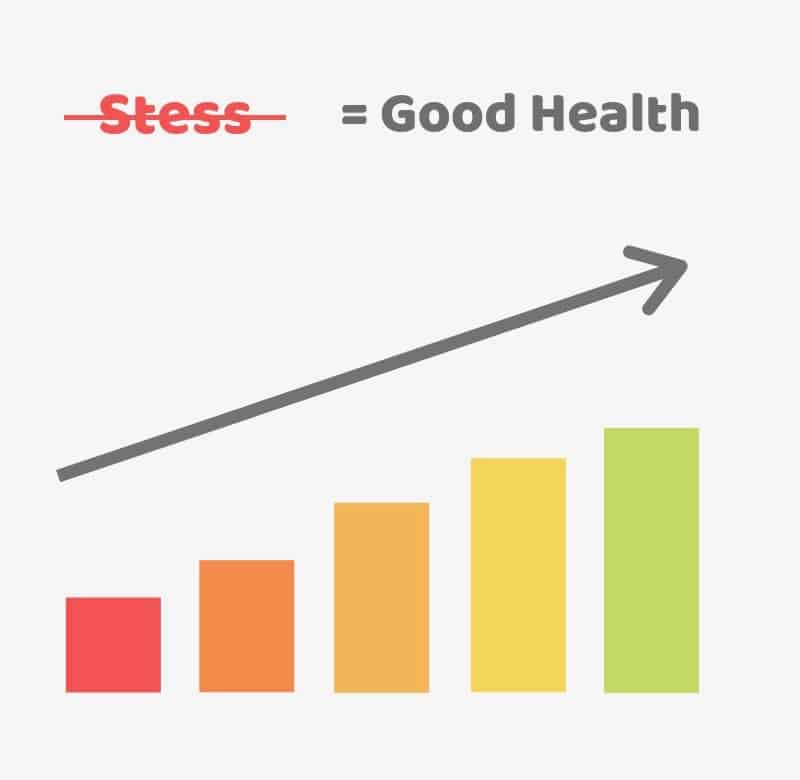by Daniel K: Our bodies are the best indicators for giving warning signs when we are sick or injured. But what about stress?
Stress is our bodies reaction to changes mentally, physically, and emotionally.
Our brains will fire signals to our nervous system because it thinks we are under attack, releasing hormones and chemicals such as adrenaline, cortisol, and norepinephrine.
Although this is a normal way for our bodies responding to certain situation’s, learning ways to stay healthy under stress as well as managing it, can help prevent health risks later down the road.
The 3 Types Of Stress

Acute Stress
This is the most common form of stress. Acute stress is your body’s fast reaction to a demand or challenge and can happen instantaneously, or can be anticipated.
Acute stress is not always necessarily a bad type of stress, but too much of it can be overly exhausting.
For example, you can be going on a roller coaster ride for the first time and experience worrying about what could happen.
Your body will start to trigger your fight-or-flight responses, to defend you from anticipated danger.
There can be a negative form of acute stress, such as a serious accident or life-threatening experience.
These more severe situations can lead to much greater problems later on, such as PTSD (Post Traumatic Stress Disorder).
Symptoms Of Acute Stress
Symptoms of acute stress can include:
- Excitement
- Nervousness
- Headache
- Neck Pain
- Jaw Pain
- Stomach Pain
- Heartburn
- Diarrhea
- Rapid Pulse
- Sweaty Palms
- Irritability
- Anxiety
- Anger
- Excitement
Episodic Acute Stress
Regular acute stress can happen periodically or frequently throughout the day.
People who experience this type of stress tend to find themselves always being in a rush, taking on too much, being impatient, anxious, irritable and always in a hurry.
This type of stress almost becomes a lifestyle, and most often, people will choose to be content with stress being a part of them.
Relationships can often be impacted in a negative way, and this condition can worsen if untreated.
Often times, counsel and seeking help is needed in order to adjust to a healthy lifestyle.
Symptoms Of Episodic Acute Stress
Regular patterns of episodic acute stress are similar to regular acute stress, but happen more frequently.
Symptoms can include:
- Depression and anxiety
- Short tempered
- Regular Irritability
- Mental Fatigue
- Headaches or migraines
- Diarrhea
- High-Blood Pressure
- Chest Pain
- Frequent colds and flu
- Stomach Pain
- Anger
Chronic Stress
When no attention is given to resolving acute stress, it starts to take the form of chronic stress.
This type of stress is consist, and does not go away. It can have a major negative impact on your overall health, as it begins to sicken both the mind and body.
Traumatic events such as early childhood experiences, divorce, poverty, and a negative job environment can cause chronic stress.
If unresolved, it can lead to several negative health conditions, including depression, heart disease, and can even increase the risk of cancer.
Symptoms Of Chronic Stress
Chronic stress can affect the whole body, and cause both physical and psychological symptoms, including:
- Extreme irritability
- Fatigue
- Headaches or Migraines
- Feelings of helplessness
- Difficulty Sleeping
- Depression or Anxiety
- Low self-esteem
- Loss Of Sexual Desire
- Frequent Illness
- Difficulty focusing and remembering
- Loss of appetite
How Stress Management Improves Health

Learning how you can manage and stay healthy under stress can help avoid multiple health concerns.
Understanding the signs and symptoms can help you recognize whether or not you should give attention to the way you handle your stressful situations.
Acute stress can be temporary, but if ignored it may lead to episodic stress, which can have a negative impact on your lifestyle, including diet, sleeping patterns, as well as your relationships.
Health consequences of not dealing with chronic stress can often lead to risk. These can include:
- Heart disease , which can potentially lead to stroke or heart attack
- Obesity
- Type 2 diabetes
- Insomnia
- Depression
- Sexual Dysfunction
- Anxiety Disorder
- PTSD (post traumatic stress disorder)
- Weak immune system
10 Ways You Can Stay Healthy Under Stress
1. Make Dieting A Priority
What we eat and when we eat has a large impact on the way our brains work, which is linked to stress.
Studies show that dieting affects stress levels and that foods that contain poor levels of nutritional value can trigger an increase of compulsive behavior.
Foods that contain high sugar and large amounts of saturated fat can take our hormones for a roller coaster ride, therefore increasing stress responsiveness.
Maintaining a healthy diet will help your brain function properly, help regulate hormone levels, and also help prevent conditions such as heart disease, obesity, and diabetes.
Make sure you choose healthy foods that are rich in phytonutrients and antioxidants, which help support brain health, as well as your immune system.
2. Stay Active
Regular exercise can be one of the best solutions when it comes to staying healthy under stress.
Physical activity increases your endorphins, otherwise known as the “feel good” neurotransmitters that are released by the brain. Self-confidence is likely to increase, as well as the feeling of relaxation and focus.
Staying active can also help improve sleep patterns, eating behaviors while bettering your mood.
Exercise doesn’t have to be a marathon. Although a more intensive activity will produce better results, a simple 30 to 45-minute walk or hike, daily, can be more than enough to help keep your mood in check.
3. Enforce A Healthy Sleeping Routine
Lack of proper rest can affect our eating patterns, mood, and thinking patterns throughout the day.
Making sure you get proper deep sleep, will ensure that your mind and body achieve a REM (rapid eye movement) sleeping cycle. This state of sleep allows us to store memories while helping our brain to prepare for the next day.
Reducing screen time at-least 1-2 hours before bed, and not eating too late at night can help you to achieve this level of sleep more often.
It’s agreeable to think that stress alone, can make it difficult to get a good nights sleep. However, proper dieting and exercise can help you get that quality sleep so that your mind can recollect those thoughts and have a chance to reset.
Getting regular massages done can also help you sleep better. You can either visit a professional massage therapist, or do it yourself at home. We found that scalp massagers are the best for relieving stress and helping you sleep better at night.
That is why ensuring healthy patterns in all areas is critical when trying to stay healthy under stress.
4. Attitude Of Gratitude
We’ve heard it time and time again, attitude is everything.
Everyone can agree that it is difficult to have a good attitude through stressful times, but I encourage you to practice this anyways, regardless of how you feel in the moment.
Getting up and spending a moment or two telling yourself how grateful you are for the things that you do have, can make a massive difference in how you look at your situation.
Practicing this first thing in the morning can help you set the stage for your day, and help re-wire your brain so that you receive information through a lens of optimism.
5. Consider Supplementation
Sometimes we may find it difficult to make healthy dietary choices when we are stressed. We start eating out, and not prioritizing preparing healthy meals.
Or maybe there are gaps in your diet, even with your healthy diet plan. This is where supplements come into the picture.
Ensuring you get sufficient nutrients in your body will help both your mind and body work the way it’s intended to, and also help prevent nutrition deficiency.
Make sure you get an optimal amount of omega-3, and all your other essential vitamins and nutrients, so that you have the energy required to think and perform your best.
Always take the recommended dosage as directed, and ask your doctor about certain products if you are not sure.
Although supplements are easy to take and don’t require much effort, make sure you don’t neglect nutrition from whole foods.
6. Personal Development
This one had to make it on the list because how we think and the way we direct our thoughts, has everything to do with how we handle stress.
Personally, prioritizing a routine of personal growth has helped both my wife and I develop a positive outlook on life. regardless of the circumstance or challenge we go through.
Re-wiring your brain to think differently about certain situations can help grow character, and achieve a sense of peace towards any challenge that comes your way, no matter how big or small.
Thinking in a place of empowerment and strength can be achieved by replacing unhealthy habits or temporary distractions, with healthy input such as inspirational videos, books or audio-books.
Take a look at the things in your life that corrupt your mood and good character, and replace them with positive input!
7. Meditate
Taking a moment in the day to meditate and reflect can help calm and relax your thoughts.
When we are stressed our thoughts tend to race, and this often leads to confusion, anxiety and greater feelings of stress.
Try to close the door somewhere, close your eyes, breathe slowly and recollect your thoughts, it will help to slow your heart rate down and refocus.
8. Set Realistic Goals
There is absolutely nothing wrong with being an overachiever, however, it is important to aim for goals that are realistic, in order to avoid further disappointment.
Knowing your strengths and limitations can help you have a shot at experiencing victories, which can help you achieve feelings of success and fulfillment.
Remember, we are all different and unique, with our own strengths and weaknesses. Taking on challenges one step at a time will help you stretch so that you can become fit to take on larger challenges later on.
Think of it like going to the gym, you always start off with the smallest weights and slowly progress to the bigger ones as you master them one step at a time.
If you go right to trying to lift a 50lbs dumbbell when you can only lift 20lbs, well….you’ll only stress yourself out!
9. Get Rid Of The Junk
I will never insult any one’s intelligence.
You know what the junk is that contributes negatively to your behavior and mood.
There are enough articles on how alcohol, drug abuse, poor dieting, smoking…etc affects your mood, stress levels, and increases anxiety.
The National Institute Of Alcohol Abuse and Alcoholism talks about the risks of alcohol and how it promotes stress.
Take whatever unhealthy patterns that are in your life out, and replace them with habits that will benefit you and help you think better.
Remember, what you allow to go in will come out, and only you know what changes you need to implement.
10. Choose Healthy Association
Successful entrepreneurs are masters at managing stress, and one of the greatest common denominators that you can identify is their association.
Jim Rohn, a highly successful businessman says: You’re the average of the five people you spend the most time with.
I don’t know about you, but ill follow the advice of someone who is successful over someone who is not, any day…
Being around people who are uplifting and are encouragers, who listen and are supportive, can help you pull through stressful times.
Healthy relationships can be powerful. Making sure that you set boundaries with those who feed your stress can help you cultivate a healthy mindset, and avoid isolation which can often do more harm than good.
Find someone who you know that you can trust and listen, then commit to reaching out at least once every couple of days.
Relationship and fellowship can be one of the best remedies for stress!
When To Get Help
If you find yourself in a place where stress is affecting your life in a negative way, and you cannot find a solution on your own, be sure to reach out to either a family member or close friend.
If you have nobody, look for a local social worker, reach out to someone that you can trust at your work, a local church, or an organization that you think can help.
You can also track your health including your heart rate and day to day patterns with devices such as fitness watches or other monitors. These can be great ways of detecting extreme issues such as abnormal heart beats or signs of stroke and heart attack.
Get help from a family doctor or social worker as soon as possible if you experience any of the below symptoms:
- Thoughts of suicide
- Constant depression and anxiety
- Thoughts of self-inflicting harm
- Complete lack of sleep or diet
- Coping using substances (ie..drugs, alcohol)– If you do not know who to call and need help fast, you can click here for a helpline!


















































